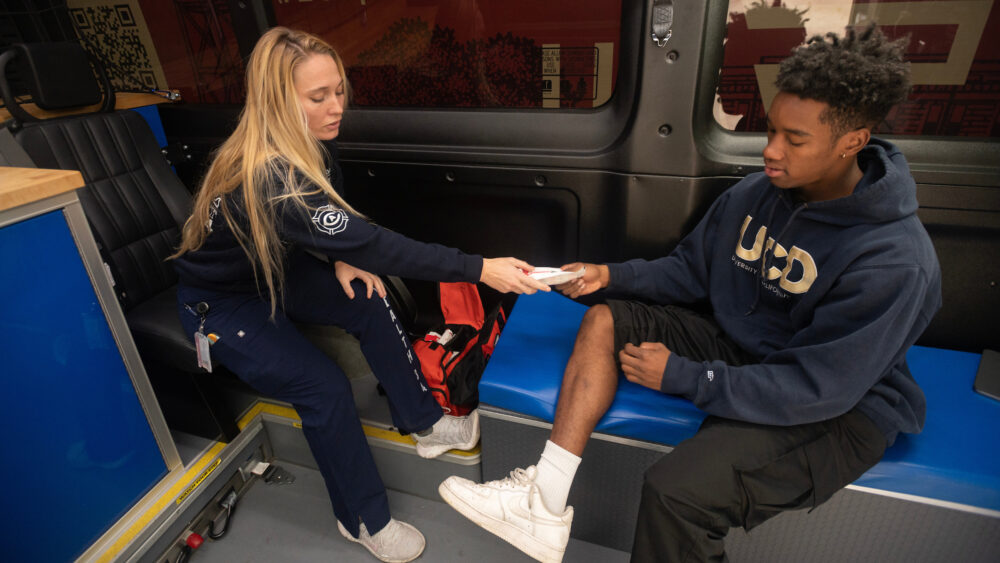There is no speeding vehicle, no sirens or flashing lights. In response to a call from a University of California, Davis (UC Davis), student in distress, instead, a red van lumbers out from the campus fire department to meet her.
A health education specialist, trained in lay counseling, and an emergency medical technician, or EMT, step out ready to listen and offer the care and resources of the campus and beyond.
Health 34, a unit of the UC Davis Fire Department, started September 5 at the leading edge of mobile response teams recently established by some universities to help address mental health and other student needs in a nonemergency setting. The UC Davis service is distinguished by its 24/7/365 operation, the range of help it provides, and the team’s experience responding to what can be the worst moments of people’s lives.
Nonemergency Care and Compassion for UC Davis Community
Providing its services at no charge, Health 34 is part of the university’s commitment to reform public safety on campus. Both the associated students of UC Davis and the recent task force on Next Generation Reforms to Advance Campus Safety have called for new approaches to crisis intervention and mental health support.
“It really is about fundamentally re-imagining how we as an institution care for our community before people reach crisis,” said Nate Trauernicht, chief of the fire department.
“It’s an effort to try to prevent crisis whenever and wherever possible by reaching people on a hard day and providing them compassion and supportive services,” he added. “That can be anything from mental health support to physical health issues to basic needs services.”
Health 34 had been in development for nearly two years, Trauernicht said. Support includes about $700,000 in state funding for mental health equity in higher education and $300,000 from the campus, including the transfer of funding for what had been a vacant position in the UC Davis Police Department.
Each day, there are five or six calls to Health 34’s own special number (530) 754-3434: everything from panic attacks and talk of self-harm to an empty fridge and not knowing how to care for a sprained ankle.
Team Background and Training
The core of Health 34 is a team of four who work 24-hour shifts. When a community member calls for help, a team member is paired with an EMT also employed by the fire department. They are backed by the expertise of Lisa Mills, a professor of emergency medicine and a physician in the emergency department at UC Davis Health who serves as the fire department’s medical director, and Dana Bentley, a nurse navigator with the fire department.
The team members are called health education specialists. Three are licensed paramedics, and the fourth, an EMT, is working toward that qualification. Their collective experience includes lifeguarding, working at a boy’s group home, serving as a flight medic, responding to calls for ambulances, and teaching in the fire department’s paramedic and EMT programs. One, Tanee Chum, graduated from UC Davis with a bachelor’s degree in anthropology in 2016 and earned an EMT certificate here in 2018. Along with the chief and nurse navigator, all have completed a 65-hour program in lay counseling.
The Health 34 van is unlike an ambulance. The rear doors open to storage for basic needs items including food, bottled water, and toiletries. A side door, equipped with a wheelchair lift, leads to an area with seats and benches. The wrap on the windows provides privacy for conversations.
Someone To Listen and Help
Destiny Rogers said she and her teammates offer an empathetic ear, sometimes a cold compress for a minor injury. They may provide information on resources and help someone develop a plan to address their situation and make a medical or counseling appointment as the next step. At a student’s request, Health 34 might provide a ride to see a campus counselor or psychiatrist available on short notice.
The health education specialists said the calls are all different. Blythe Clark recalled one of her first. The student who had reached out for help indicated she benefitted from walking. “So we went for a walk around the Quad,” Clark said.
Informal Nature
Paul Kim, director of counseling services at UC Davis, said the informal nature of Health 34 can be appealing for students who have not sought out the care of a therapist, and it adds to other services available outside office hours.
“Health 34 will go to where the student is,” he said. “It’s on the student’s terms.”
Health 34 is also among the ways the campus is working to reduce the stigma around seeking assistance.
“There can be anxiety asking for help,” said Chum, the UC Davis graduate. “But there are so many people willing to help you.”
Before the service launched, the team spent months not only troubleshooting different scenarios and establishing protocols, but also building connections with campus resource providers.
The work has already been rewarding Chum said.
“It’s been impactful to see the way we can touch lives and guide people out of what could have become a crisis situation.”
Julia Ann Easley is a media specialist at UC Davis.
Note: The views expressed by guest bloggers and contributors are those of the authors and do not necessarily represent the views of, and should not be attributed to, Campus Safety magazine.













